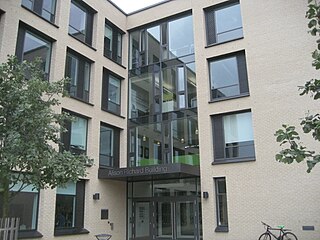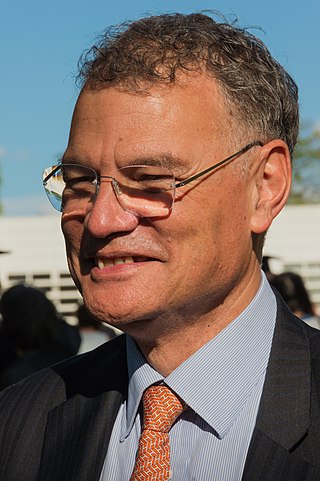
Politics of Madagascar takes place in a framework of a semi-presidential representative democratic republic, with a pluralist multi-party system. The President of Madagascar is head of state and the Prime Minister of Madagascar is head of government. Executive power is exercised by the government. Legislative power is vested in both the government and the bicameral parliament, which is composed of the Senate and the National Assembly. The Judiciary is independent of the executive and the legislature.
Colonel Richard Ratsimandrava was a Malagasy politician and soldier who served as the head of state of Madagascar for six days in February 1975 before his assassination in office.

Dame Alison Fettes Richard, is an English anthropologist, conservationist and university administrator. She was the 344th Vice-Chancellor of the University of Cambridge, the third Vice-Chancellor of Cambridge since the post became full-time, and the second woman. Before arriving at Cambridge, she served as the provost of Yale University from 1994 to 2002.

Didier Ignace Ratsiraka was a Malagasy politician and naval officer who was the third President of Madagascar from 1975 to 1993 and the fifth from 1997 to 2002. At the time of his death, he was the longest-serving President of Madagascar.

Gabriel Ramanantsoa was a Malagasy politician who served as the second President and eighth Prime Minister of Madagascar from 1972 to 1975.

The Malagasy Republic was a state situated in Southeast Africa on the island of Madagascar. It was established in 1958 as an autonomous republic within the newly created French Community, became fully independent in 1960, and existed until the proclamation of the Democratic Republic of Madagascar in 1975.

A constitutional referendum was held in Madagascar on 4 April 2007. The proposed changes, which voters were asked to approve or reject as a whole, included:

The current Constitution of Madagascar was, according to the national electoral commission, endorsed by a majority of voters in the constitutional referendum held on 14 November 2010. The new constitution launched the Fourth Republic of Madagascar and was widely seen as an attempt to consolidate and legitimise the rule of Andry Rajoelina and his High Transitional Authority government which was installed after a military-backed coup d'état against President Marc Ravalomanana at the beginning of the ongoing national political crisis. One substantive change from the constitution of the Third Republic was to lower the minimum age for presidential candidates from 40 to 35. This made Rajoelina, aged 36 at the time, eligible to stand in presidential elections.
Tsimisotry Ramanantsoa is a Malagasy politician. A member of the National Assembly of Madagascar, he was elected as a member of the Tiako I Madagasikara party in the 2007 Malagasy parliamentary elections. He represents the constituency of Morafenobe.

A constitutional referendum was held in Madagascar on 17 November 2010, in which voters approved a proposal for the state's fourth Constitution. The Malagasy people were asked to answer "Yes" or "No" to the proposed new constitution, which was considered to help consolidate Andry Rajoelina's grip on power. At the time of the referendum, Rajoelina headed the governing Highest Transitional Authority (HAT), an interim junta established following the military-backed coup d'état against then President Marc Ravalomanana in March 2009.

Presidential elections were held in Madagascar on 30 January 1972. Incumbent President Philibert Tsiranana of the Social Democratic Party was the only candidate, and won the approval of 99.7% of voters. However, public unrest led to him handing over power to General Gabriel Ramanantsoa. Ramanantsoa put forward proposals for a five-year transition period during which the National Assembly would be suspended. The plans were approved in a referendum later in the year.

A referendum on the new constitution of France was held in Madagascar on 28 September 1958 as part of a wider referendum held across the French Union. The new constitution would see the country become part of the new French Community if accepted, or result in independence if rejected. It was approved by 77.64% of voters. The country subsequently became independent on 26 June 1960.

A constitutional referendum was held in Madagascar on 21 December 1975. The new constitution created a presidential republic, with the president serving seven-year terms and incumbent President Didier Ratsiraka was to serve the first term without being elected. It also created a High Revolutionary Council to create a "socialist revolution" and a military committee to oversee socio-economic development. Madagascar was transformed into the Democratic Republic of Madagascar. All political parties with the exception of those "loyal to the socialist revolution" were to be banned, and those that were allowed to exist would have to be affiliated with the National Front for the Defense of the Revolution, which was led by Ratsiraka's AREMA party.

A constitutional referendum was held in Madagascar on 19 August 1992. The new constitution created a semi-presidential system and a Senate. It was approved by 73% of voters, with a 65% turnout.

A constitutional referendum was held in Madagascar on 25 March 1998. The proposed amendments would allow the president to dissolve parliament, and divide the country into six provinces. It was narrowly approved by just 50.96% of voters, with a 70% turnout.

Brookesia bonsi is a species of chameleons, a lizard in the family Chamaeleonidae. The species is endemic to Madagascar, and was initially described by Guy A. Ramanantsoa in 1980. The International Union for Conservation of Nature ranked this species as Critically Endangered.

Bernard Ramanantsoa was the Dean of HEC Paris between 1996 and 2015.
The Southwest Madagascar Coastal Current (SMACC) is a warm poleward ocean current flowing in the south-west of Madagascar.
Marcelle Larguier was a Malagasy political figure who served as the second First Lady of Madagascar from 1972 to 1975 during the presidency of her husband, General Gabriel Ramanantsoa.







